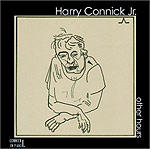
|
|||
|
|||
| Home |
| Gallery |
| Culture/ Technology |
| Fiction |
| Music |
| Poetry |
| Theater |
| What's New |
| About/Contact |
| Archive |
|
A top-notch jazzman From the Autumn 2003 issue.
Harry Connick Jr. has been cast – marketed, even – as the second coming of Sinatra. A ladies' man, a sophisticate. A smooth, urbane man about town who can still croon with the best of them. All of which he may very well be. But what his latest release, on the independent Marsalis family label, shows more than anything else is that Connick is also a very solidstraight-ahead jazz musician. For all his considerable talent, despite his willingness and ability to front the world's best jazz big bands, Frank Sinatra wasn't at heart a jazz singer. He never learned to vocally improvise like Ella Fizgerald or Louis Armstrong. Nobody was a better interpreter of popular music than Sinatra, but he was no jazzman. Connick, however, is. A strong, gifted and lithe jazz pianist. In the unforgiving environment of a jazz quartet, Connick positively shines as pianist. Strongly imaginative, able to convey both strength and tenderness, Connick's piano playing here is as rewarding as it is revealing. On this new release, he and his quartet run through an even dozen instrumentals, all from Connick's own pen. All are straight-ahead jazz in a post-bop mode; quiet, introspective pieces full of long solos for each of the men. All of which will serve as quite a surprise – pleasantly so for jazzheads who've liked Connick's earlier playing all right but never accepted it as jazz; perhaps less so for diehard Connick fans who've thoroughly enjoyed his light touch at pop music. For this is heavy stuff; never ponderous, but deep, meaningful art music that demands you pay attention, that requires effort to wrap your head around what he and his sidemen are doing. In fact, "Other Hours" has far more in common with Wynton Marsalis' jazz recordings than it does with anything else Connick has tackled in a studio. Of course, Connick studied piano with Marsalis' father, Ellis – and it is Wynton and his family who own the label for which Connick is now recording. The compositions are serious jazz, although accessible – like a slightly less breezy Vince Guaraldi approach (Guaraldi wrote the music for the "Peanuts" TV specials, and had the hits "Cast Your Fate to the Wind"). Melodic and intriguing as ever, Connick's songwriting remains instantly likeable. It's just that in a jazz quartet setting, we get to hear another side to his musical vision – and the intellectual side of Connick is every bit as rewarding as the popular entertainer. Here's looking forward to Connick on Piano 2. Review by Jim Trageser. Jim is a writer and editor living in Escondido, Calif., and was a contributor to the "Grove Press Guide to Blues on CD" (1993) and "The Routledge Encyclopedia of the Blues" (2005). |
Copyright © Turbula.net

